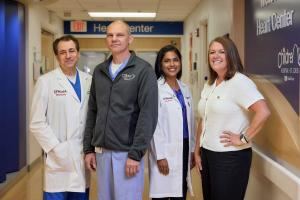St. Louis Children’s Hospital, WashU Medicine Team Perform First Pediatric “Domino” Partial Heart Transplant in Midwest
With clinicians’ commitment to innovative care, the Heart Center has become one of only eight programs in the nation to perform this rare, lifesaving procedure.
None of this would be possible without the trust our patients’ families place in us and the extraordinary generosity of donor families, whose decisions give hope to others.”
ST. LOUIS, MO, UNITED STATES, October 13, 2025 /EINPresswire.com/ -- ST. LOUIS (October 13, 2025) – This summer, a team at St. Louis Children’s Hospital and WashU Medicine Heart Center successfully performed the first living pediatric “domino” partial heart transplant in the Midwest. The groundbreaking procedure has been performed at only seven other hospitals in the U.S. — Dr. Eli Fredman, a WashU pediatric cardiologist at St. Louis Children’s
The highly complex surgery required the skill of more than 20 specialists working in two operating rooms—including WashU Medicine pediatric heart transplant surgeons, cardiologists, cardiac intensivists, and anesthesiologists—along with inpatient and operating room nurses, perfusionists, transplant coordinators, Child Life Specialists, and other practitioners at St. Louis Children’s.
A domino transplant occurs when one donor’s organ is transplanted into a patient, who then becomes a donor for another patient. In this case, the first pediatric patient needed a new heart. Despite damage to the patient’s heart, the heart valves were healthy, which offered an opportunity for another child to benefit. When a donor heart became available, the first patient received a total heart transplant. Surgeons then removed that patient’s fully functioning aortic heart valve and transplanted it into another young patient whose aortic valve was failing. Through this domino procedure, two children received lifesaving treatment.
“One donor gave the gift of life that ultimately helped two children,” said Dr. Jacob Miller, a WashU Medicine pediatric heart surgeon at St. Louis Children’s Hospital who specializes in the
diagnosis and surgical treatment of congenital heart defects. “This was a remarkable team effort, and it was incredible to witness how everyone came together to perform such an innovative procedure. The expertise and collaboration that made this possible is extraordinary, and we’re so gratified that both patients are doing well.”
Typically, when children need a new heart valve, the standard options are a prosthetic valve, or a cryopreserved valve taken from a deceased donor and preserved by freezing at very low temperatures to maintain its viability. Although lifesaving, prosthetic and cryopreserved valves will need to be replaced as the child grows. A partial heart transplant — also known as a heart valve transplant — offers a promising alternative, with the expectation that the transplanted valve will grow along with the child, eliminating the need for multiple surgeries.
The St. Louis Children’s Hospital and WashU Medicine Heart Center operates one of the largest and most successful pediatric heart transplant programs in the country. It serves more children with heart disease than any other center in the region and draws patients from across the Midwest and beyond, including referrals from other transplant programs.
Planning to perform a domino partial heart transplant began several years ago. The Heart Center’s preparations were led by Dr. Lakshmi Gokanapudy Hahn, a WashU Medicine pediatric heart transplant cardiologist, and championed by Dr. Pirooz Eghtesady, Chief of Pediatric Cardiothoracic Surgery at WashU Medicine and Co-Director of the Heart Center. Since then, the team has honed the logistics necessary to successfully perform the procedure for the first time and established a foundation for future patients. As part of their preparations, St. Louis Children’s Hospital also became a registered tissue processing center, allowing valves to be prepared for transplant within the hospital.
“Everything must line up perfectly for a domino transplant,” said Dr. Janet Scheel, a WashU Medicine pediatric cardiologist and medical director of the pediatric heart transplant program at St. Louis Children’s Hospital. “The timing is incredibly precise, and the expertise of the entire team was essential to making it possible. It truly takes everyone working in perfect coordination.”
St. Louis Children's Hospital and WashU Medicine have been at the forefront of pediatric organ transplantation for decades, thanks in part to the Heart Center’s close association with the adult transplant center at Barnes-Jewish Hospital, also located on the Washington University Medical Campus. In addition to the heart transplant program, St. Louis Children's Hospital and WashU Medicine have pediatric transplantation programs for lung, kidney, liver, and bone marrow, and is one of the only pediatric programs in the country to perform heart-lung transplants.
“This is a milestone for our team and for patients and families hoping for long-term solutions,” said Dr. Eli Fredman, a WashU Medicine pediatric cardiologist at St. Louis Children’s Hospital. “None of this would be possible without the trust our patients’ families place in us and the extraordinary generosity of donor families, whose decisions give hope to others.”
A recent study published in JAMA analyzed data from 19 patients who underwent valve transplantation to replace failing heart valves. The research indicates that the transplanted valves functioned reliably and continued to grow in young children. The patients were followed for an average of six months, and researchers will continue to monitor their valve function over time.
Going forward, the Heart Center team will follow both patients to monitor their recoveries and long-term health, especially the growth of the donor valve. The team is now evaluating several other patients as candidates for living heart valve transplants.
In 2024, the St. Louis Children’s and WashU Medicine Heart Center became the first pediatric heart transplant program in the country to surpass 600 pediatric heart transplants.
# # #
Laura High
BJC Health System
laura.high@bjc.org
Legal Disclaimer:
EIN Presswire provides this news content "as is" without warranty of any kind. We do not accept any responsibility or liability for the accuracy, content, images, videos, licenses, completeness, legality, or reliability of the information contained in this article. If you have any complaints or copyright issues related to this article, kindly contact the author above.

